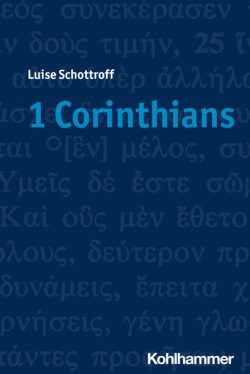Читать книгу 1 Corinthians - Luise Schottroff - Страница 42
На сайте Литреса книга снята с продажи.
4:1–5
ОглавлениеPaul follows the praise of the body of Christ in 3:21b–23 with sober thoughts about the competence of the congregation in legal matters. The congregation possesses judicial competence (cf. 2:15; see on 6:1; 5:1–13), but it has clear boundaries when it comes to decisions that God alone will make. Thus, the congregation can pass judgment on people who are commissioned by God to teach, prophesy, etc., but the congregation must continue to be aware of the limited nature of its judgment. The interpretive history of this passage is burdened by the frequent presupposition that in Corinth Paul was dealing with opponents whom he vehemently opposed (in 4:3, for example).
4:1 gives the theme for the brief section (4:1–5): The issue is the congregation’s evaluation of the work of people like Paul and Apollos. It is possible that the word Paul chose (anthrōpos): »A person (or human)/anthrōpos should think of/evaluate …« is meant to point to the difference between divine and human judgment (cf. 4:3, 5). In the translation above, I have decided in favor of an interpretation in which Paul is thinking about the congregation and therefore chose the plural: »You [pl.] should evaluate us in this way ….« The subject of the evaluation can only be the work done at the behest of the Messiah. For himself and others, therefore, Paul points to the commission: to serve the Messiah and to deal responsibly with God’s secrets (on this see at 2:7).
4:2 That means that the evaluation can deal only with the trustworthiness with which the Messianic commission is fulfilled.
4:3 Paul would like to call the criteria to mind. The congregation has a right to judge him, but his salvation does not depend on what they decide, because the verdict is rendered by a human court [Literally, a human day—Trans.]. The concept of a human day of judgment/anthrōpinē hēmera is probably an ad hoc neologism based on biblical language about the day (of judgment), but it does not refer to judicial proceedings before municipal or Roman authorities (such as those in Acts 18:12–17). Here the concept refers to a congregational assembly and makes clear the distinction between its judgment and God’s. Is 4:3 meant to disparage their judgment? One can read the sentence this way, but also quite differently: Paul wants to clarify the criteria. The issue is evaluation by humans (not by God), be it by the congregation or another human court, be it he himself doing it through self-examination, something he rejects. What that produces, according to 4:4, is the impression of being aware of no guilt. The result of such alleged self-examination has no relevance for the question of whether he is righteous in the sight of God. Of that, God alone is judge.
In 4:5 criticism of what’s been going on in the congregation emerges. In the congregation, there could be people who proleptically arrogate to themselves God’s judgment with respect to Paul, Apollos and people like them. It could be that that relates to the competence of the congregation to render a judgment about people battling one another; indeed, Paul returns to these rivalries in 4:6–7.
4:5b says that God’s judgment makes things right: Everything that is hidden will be brought to light, and God encounters the truth about every single person. The »purpose of the hearts« stands for the person as a whole and encompasses the mind, decision-making, desire and trust.182 The »reward« for what one does in life (3:8, 14) is God’s approval. Here, as well as in 3:14–15, God’s judgment is not depicted as a punitive event but as a place of ultimate salvation. In the formulations »the things now hidden in darkness« and the »plans/desire/purposes of the heart,« Paul is varying biblical language.183
4:1–5 makes clear the significance of the comprehensive justice of God’s judgment for our life-together in the present: Where people lose the proper criteria, that is where God’s future judgment sets necessary limits. 4:1–5 is not all-purpose instruction, but a protest evoked by what’s been stated: the accommodation to the »world’s« power-structures that is going on within the congregation.
